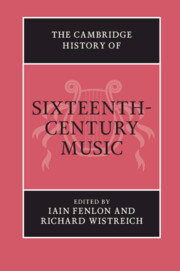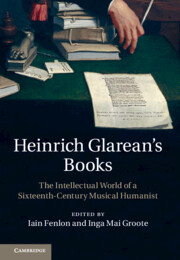74 results
Women and Music in Sixteenth-Century Ferrara. Laurie Stras. New Perspectives in Music History and Criticism. Cambridge: Cambridge University Press, 2018. xxiv + 392 pp. $99.99.
-
- Journal:
- Renaissance Quarterly / Volume 73 / Issue 3 / Fall 2020
- Published online by Cambridge University Press:
- 02 October 2020, pp. 1096-1098
- Print publication:
- Fall 2020
-
- Article
- Export citation
Index
-
- Book:
- The Cambridge History of Sixteenth-Century Music
- Published online:
- 08 January 2019
- Print publication:
- 24 January 2019, pp 502-520
-
- Chapter
- Export citation
Maps
-
- Book:
- The Cambridge History of Sixteenth-Century Music
- Published online:
- 08 January 2019
- Print publication:
- 24 January 2019, pp xvii-xxii
-
- Chapter
- Export citation
6 - Urban Soundscapes
- from Part II - Culture, Place, and Practice
-
-
- Book:
- The Cambridge History of Sixteenth-Century Music
- Published online:
- 08 January 2019
- Print publication:
- 24 January 2019, pp 209-259
-
- Chapter
- Export citation
Introduction
-
-
- Book:
- The Cambridge History of Sixteenth-Century Music
- Published online:
- 08 January 2019
- Print publication:
- 24 January 2019, pp 1-24
-
- Chapter
- Export citation
Notes on the Contributors
-
- Book:
- The Cambridge History of Sixteenth-Century Music
- Published online:
- 08 January 2019
- Print publication:
- 24 January 2019, pp xi-xiv
-
- Chapter
- Export citation
Part II - Culture, Place, and Practice
-
- Book:
- The Cambridge History of Sixteenth-Century Music
- Published online:
- 08 January 2019
- Print publication:
- 24 January 2019, pp 207-378
-
- Chapter
- Export citation
Copyright page
-
- Book:
- The Cambridge History of Sixteenth-Century Music
- Published online:
- 08 January 2019
- Print publication:
- 24 January 2019, pp iv-iv
-
- Chapter
- Export citation
Abbreviations
-
- Book:
- The Cambridge History of Sixteenth-Century Music
- Published online:
- 08 January 2019
- Print publication:
- 24 January 2019, pp xvi-xvi
-
- Chapter
- Export citation
Part III - Institutions, Ideas, and the Order of Nature
-
- Book:
- The Cambridge History of Sixteenth-Century Music
- Published online:
- 08 January 2019
- Print publication:
- 24 January 2019, pp 379-501
-
- Chapter
- Export citation
Acknowledgements
-
- Book:
- The Cambridge History of Sixteenth-Century Music
- Published online:
- 08 January 2019
- Print publication:
- 24 January 2019, pp xv-xv
-
- Chapter
- Export citation
Part I - Confessions, Identities, and Rhetorics of Power
-
- Book:
- The Cambridge History of Sixteenth-Century Music
- Published online:
- 08 January 2019
- Print publication:
- 24 January 2019, pp 25-206
-
- Chapter
- Export citation
Contents
-
- Book:
- The Cambridge History of Sixteenth-Century Music
- Published online:
- 08 January 2019
- Print publication:
- 24 January 2019, pp v-vi
-
- Chapter
- Export citation
Maps and Figures
-
- Book:
- The Cambridge History of Sixteenth-Century Music
- Published online:
- 08 January 2019
- Print publication:
- 24 January 2019, pp vii-x
-
- Chapter
- Export citation

The Cambridge History of Sixteenth-Century Music
-
- Published online:
- 08 January 2019
- Print publication:
- 24 January 2019
Mirrors of Heaven or Worldly Theaters? Venetian Nunneries and Their Music. Jonathan E. Glixon. Oxford: Oxford University Press, 2017. xviii + 452 pp. $55.
-
- Journal:
- Renaissance Quarterly / Volume 71 / Issue 4 / Winter 2018
- Published online by Cambridge University Press:
- 14 January 2019, pp. 1549-1550
- Print publication:
- Winter 2018
-
- Article
- Export citation
Manuscript Inscriptions in Early English Printed Music. David Greer. Music and Material Culture. Farnham: Ashgate, 2015. xx + 206 pp. $109.95.
-
- Journal:
- Renaissance Quarterly / Volume 69 / Issue 4 / Winter 2016
- Published online by Cambridge University Press:
- 20 November 2018, pp. 1557-1559
- Print publication:
- Winter 2016
-
- Article
- Export citation
Index
-
- Book:
- Heinrich Glarean's Books
- Published online:
- 05 September 2013
- Print publication:
- 22 August 2013, pp 376-382
-
- Chapter
- Export citation
Heinrich Glarean’s Books - Title page
-
-
- Book:
- Heinrich Glarean's Books
- Published online:
- 05 September 2013
- Print publication:
- 22 August 2013, pp iii-iii
-
- Chapter
- Export citation

Heinrich Glarean's Books
- The Intellectual World of a Sixteenth-Century Musical Humanist
-
- Published online:
- 05 September 2013
- Print publication:
- 22 August 2013



